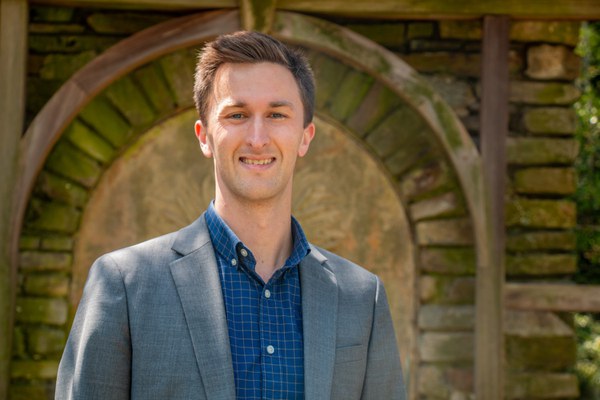Nathan Tilley, PhD candidate in religion at Duke University, was a 2021–2022 junior fellow in Byzantine Studies. His research report, “Human Nature in the Thought of Bābai the Great: Controversy and Tradition in the Formation of East Syrian Identity,” explored the connections between science and Bābai the Great’s thought on body-soul union in Greek texts.
Q&A with Nathan Tilley
Who is Bābai the Great, and what was his significance?
Bābai was a sixth- and seventh-century writer and leader of monasteries who was influential among Christians living in the Persian Empire in the early Byzantine period. I came upon Bābai via a commentary he had written on Evagrius of Pontus, a very famous and controversial Christian monk and philosopher. Bābai and his thought were important for the elite theological tradition of the Church of the East, or East Syrian Christians, and he was also remembered for his monastic and church reforms at the time.
How do his writings address medicine and human nature?
Bābai was educated in Nisibis, where there was an active medical community of sorts—a small institution, not really a formal school, where there were doctors. His theology is remarkable for being very corporeal, using medicine and what we might call clinical evidence to think about the body-soul unity, which was a major theological question at the time. He endorses a view where the soul is almost nonexistent apart from the body. To him, since someone can’t properly function and an infant doesn’t live when the brain or other parts of the body are damaged, it means the soul is not preexisting, immaterial, or supernatural apart from the body.
This was part of a larger question about the time of ensoulment—when the soul comes into the human body. Bābai was concerned with views that put the soul as preexistent, as if it fell into bodies, which was a view controversial to almost all Christians at the time. He was also concerned about immediate ensoulment—when the soul enters the body immediately at birth—because for him it didn’t seem like the body would be able to support a functioning soul until it grows a bit; specifically, until forty days after birth. He was really interested in how bodily conditions and what we are as human bodies support and interact with immaterial psychic reality. Almost all Christian authors of this period except for a few early ones believed the rational soul is largely immaterial—it exists separately as its own thing, for lack of a better word—but Bābai was hesitant to give the soul much existence apart from its union with the body.
What was the role of this view in East Syriac and early Byzantine culture?
These debates arise not really because of science or even the soul but rather in discussions of the nature of Christ, which was a major theological issue for Christians. For Bābai, ideas about the science of embryos and human growth informed central theological issues of how the human and divine interact. He moves from high-level theoretical debates about Christology down into these material matters of science, and I think part of the reason he does this is that a lot of these scientific texts were just coming into Syriac, physically being brought in from Constantinople or perhaps Alexandria to Mesopotamia and then translated into Syriac. There’s good evidence Bābai was familiar with the thought of John Philoponus, whose ideas about embryology resemble Bābai’s (or vice versa) very closely. Bābai also would have known bits of Aristotle and Galen as well, though there’s less specifically Galenic about his embryology.
This is part of my bigger project looking not just into scientific texts but Greek texts in general and how their introduction into Syriac affected theological and philosophical developments. Bābai, being a technical, elite author, offers a great window into this process. I’m interested in what happened when they took these texts that come from different areas and wove them together. Bābai was part of this first stage of assimilating Greek texts into Syriac where people who we think are very different were read together. For example, as Bābai’s views on the non-separable soul made it into the East Syriac tradition, they too became a bit controversial. And later writers had to square his thoughts with others who said that there is an immortal soul.
Here at Dumbarton Oaks it’s been fun to have a lot of people working on the edges of Byzantium and who are interested in intellectual movement, like Samet Budak, who doesn’t do Syriac but we’ve talked a lot about how intellectual history and how texts move. Robin Young and Emanuel Fiano have also been great to talk with as scholars working in Syriac.
May Wang was the 2020–2022 postgraduate writing and reporting fellow. Photo by Emily Orr, 2021–2022 humanities fellow.

